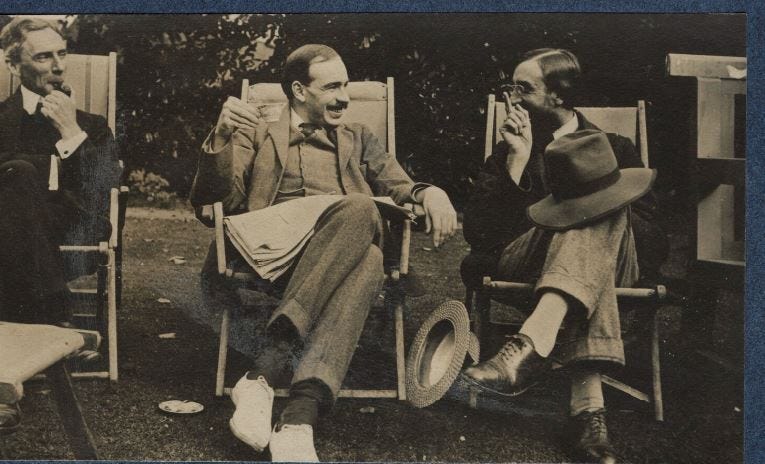Through a window, brightly
Quote of the Day
“The great charm in argument is really finding one’s own opinions, not other people’s.”
Evelyn Waugh
Musical alternative to the morning’s radio news
Haydn | Abschiedssymphonie, final movement | New Year’s Day concert, Vienna 2009 | Barenboim conducting the Wiener Phil
Long Read of the Day
Deep Reading Will Save Your Soul
Really interesting (and optimistic) essay by William Deresiewicz.
Higher ed is at an impasse. So much about it sucks, and nothing about it is likely to change. Colleges and universities do not seem inclined to reform themselves, and if they were, they wouldn’t know how, and if they did, they couldn’t. Between bureaucratic inertia, faculty resistance, and the conflicting agendas of a heterogenous array of stakeholders, concerted change appears to be impossible. Besides, business is good, at least at selective schools. The notion, floated now in certain quarters, that students and parents will turn from the Harvards and Yales in disgust is a fantasy. As long as elite institutions remain the principal pipeline to elite employers (and they will), the havers and strivers will crowd toward their gates. Everything else—the classes, the politics, the arts and sciences—is incidental.
Which is not to say that interesting things aren’t happening in post-secondary (and post-tertiary) education. They just aren’t happening, for the most part, on campus…
I think this largely applies mostly to the US, but I found it intriguing, not least because I worked for many years for the Open University, and in the process saw at first hand how exposure to great literature could liberate and revitalise people who had missed out university the first time around.
Books, etc.
The life of Maynard K
This picture heads Branko Milanovic’s slightly puzzling blog post about Zachary Carter’s fine biography of John Maynard Keynes. The photograph was probably taken at Garsington, the country home of Lady Ottoline Morrell (and was probably taken by her because she was at one time a keen snapper). From right to left it shows Lytton Strachey, Keynes and Bertrand Russell, sucking quizzically on his pipe, and possibly thinking about Ottoline, with whom he had a famous affair.
The photograph is interesting for many reasons, but it’s the sartorial dimension of it that intrigued me. Here are three celebrated intellectuals of the day on a summer afternoon in the garden of a stately pile. Yet they are all dressed formally, though Keynes, in a touch of flamboyance, has white leather shoes which look odd alongside his immaculately-cut tweed suit. It seems a strange way to relax on a country house weekend.
The puzzling thing about Milanovic’s essay is that he seems to have got the relationship between Keynes and FDR wrong.
Despite his many political connections, he was not much of a policy prophet in his own land. But with the New Deal and Roosevelt’s policies his glory was assured. In fact, FDR played for Keynes the same role that Lenin played for Marx. Without the politicians, both Marx and Keynes would have been moderately well-known political economists, agitators and pamphleteers. But once adopted by the powers-to-be (in the case of Keynes extending all the way to Reagan), their fate justified Keynes own view on the value of ideas, expressed towards the end of The General Theory: “Practical men, who believe themselves to be quite exempt from any intellectual influence, are usually the slaves of some defunct economist.”
I haven’t got Carter’s book to hand as I write, but my memory of that part of it is that FDR couldn’t abide Keynes when they two met (and nor could FDR’s economic advisers), and one of the reasons Keynes embarked on his General Theory is that he felt he needed a theoretical argument to impress those who were giving the President economic advice. Also, it seems odd to say that Keynes’s ideas influenced Reagan. That seems implausible to me.
But then I’m no economist. And no historian either.
My commonplace booklet
From The Register:
In 2013 The New York Times and other media outlets saw their operations come under attack by a bunch of miscreants calling themselves the Syrian Electronic Army. During these incidents, which occurred over a period of months, readers were unable to visit some publications’ websites at times; at other times, pages were defaced by intruders. _ > *The Register* was targeted, too, by the gang in a failed spear-phishing attack. At least one of our vultures was sent an email claiming to be from a senior editor, with a link to a fake copy of our publishing system to phish their credentials; the giveaway was that the message was far too cheery for that editor to be real. It also prompted us to introduce mandatory multi-factor authentication at work.
Don’t you just love the reasoning that alerted the Register’s hacks! That would have been familiar in any print newspaper in the old days too.





